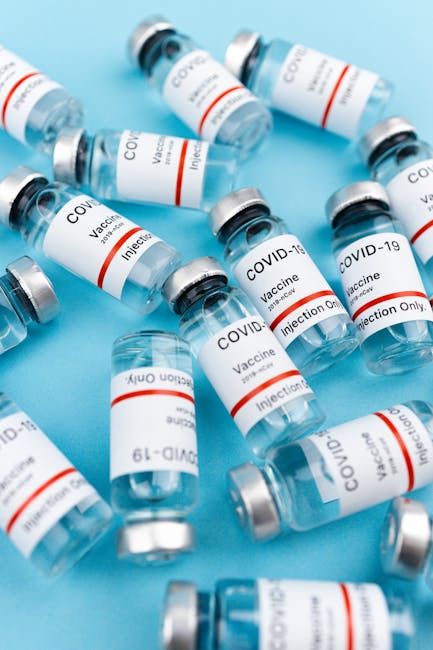COVID-19 Vaccine News: Updates, Efficacy, Safety, and the Future of Immunization
The COVID-19 pandemic dramatically reshaped global health, prompting an unprecedented race to develop effective vaccines. This article provides comprehensive, up-to-date information on COVID-19 vaccine news, covering efficacy, safety, ongoing research, and the long-term implications for public health. We will delve into the various vaccine types, address common concerns, and explore the future of vaccination strategies.
The Race for a Vaccine: A Retrospective
The rapid development and deployment of COVID-19 vaccines stand as a testament to scientific innovation. Operation Warp Speed in the United States, and similar initiatives globally, prioritized research, development, and manufacturing, resulting in the authorization of several vaccines within record time. This accelerated timeline, however, was not without scrutiny, prompting intense public debate on safety and efficacy.
mRNA Vaccines: A Technological Leap
The mRNA vaccines, such as those developed by Pfizer-BioNTech and Moderna, represent a significant advancement in vaccine technology. These vaccines utilize messenger RNA (mRNA) to instruct the body’s cells to produce a harmless piece of the virus’s spike protein, triggering an immune response. This technology offers several advantages, including relatively rapid development and potential for adaptation to new variants.
Viral Vector Vaccines: A Different Approach
Viral vector vaccines, like the AstraZeneca/Oxford and Johnson & Johnson vaccines, use a modified, harmless virus to deliver the genetic instructions for producing the spike protein. This method has been used in previous vaccines and offers a different approach to eliciting an immune response. However, these vaccines have also faced scrutiny, particularly regarding rare side effects.
Inactivated Vaccines: A Traditional Method
Inactivated vaccines, such as those developed by Sinovac and Sinopharm, use a killed version of the virus to stimulate an immune response. This approach is more traditional and generally considered safer in terms of the risk of infection, although it might not be as effective as mRNA or viral vector vaccines in preventing infection.

Vaccine Efficacy and Ongoing Research
The efficacy of COVID-19 vaccines varies depending on the type of vaccine and the circulating variant. Initial trials showed high efficacy rates in preventing severe illness, hospitalization, and death. However, emerging variants, such as Delta and Omicron, posed challenges, necessitating the development of updated vaccines and booster shots.
Ongoing research continues to focus on several key areas, including:
- Variant-specific vaccines: Developing vaccines that effectively target emerging variants of concern.
- Long-term efficacy: Studying the duration of vaccine-induced immunity and the need for booster shots.
- Vaccine effectiveness in different populations: Researching vaccine efficacy in various age groups, immunocompromised individuals, and different ethnicities.
- Combination vaccines: Exploring the potential for combination vaccines that protect against both COVID-19 and other respiratory viruses.
Addressing Safety Concerns and Misinformation
Public health authorities have extensively monitored the safety of COVID-19 vaccines. While rare side effects have been reported, the overwhelming evidence confirms the vaccines’ safety and efficacy. Misinformation and conspiracy theories surrounding vaccine safety have posed significant challenges to vaccination campaigns, leading to vaccine hesitancy and a slower-than-desired uptake.
It is crucial to rely on credible sources of information, such as the World Health Organization (WHO), the Centers for Disease Control and Prevention (CDC), and other reputable public health organizations, to obtain accurate and up-to-date information on vaccine safety and efficacy.
The Future of COVID-19 Vaccination
The COVID-19 pandemic has underscored the critical need for robust global vaccination strategies. The development and deployment of vaccines in record time represent a significant achievement, but ongoing challenges remain. These include equitable vaccine distribution globally, managing vaccine hesitancy, and adapting to future viral mutations.

Addressing Global Vaccine Equity
Ensuring equitable access to vaccines worldwide remains a significant challenge. High-income countries initially secured a disproportionate share of vaccine supplies, leaving lower-income countries struggling to protect their populations. International collaboration and efforts to increase vaccine manufacturing capacity in developing countries are crucial to address this inequity.
Combating Vaccine Hesitancy
Vaccine hesitancy, fueled by misinformation and mistrust, continues to pose a threat to achieving global herd immunity. Building public trust through clear, accurate communication, addressing concerns, and promoting community engagement are essential to overcome vaccine hesitancy.
Preparing for Future Pandemics
The COVID-19 pandemic has highlighted the need for preparedness for future pandemics. This includes investing in research and development for new vaccines and therapeutics, enhancing global surveillance systems, and strengthening international collaboration to facilitate rapid response.
The Role of Continued Monitoring and Research
Long-term monitoring of vaccine safety and efficacy is crucial. Continued research will also be essential to develop improved vaccines, addressing emerging variants and developing new approaches to protect against a wide range of infectious diseases.

Conclusion
The development and deployment of COVID-19 vaccines represent a monumental achievement in the fight against a global pandemic. However, ongoing efforts are needed to address issues of global vaccine equity, combat misinformation, and prepare for future health emergencies. Staying informed about the latest COVID-19 vaccine news and relying on credible sources of information is crucial for protecting individual and public health.

